- Lose Your Money/Steal Your Heart Away (Decca F 11971) September 1964
- Go Now/It's Easy Child (Decca F 12022) November 1964 (1)
- I Don't Want To Go On Without You/It's Easy Child (Decca F 12095) February 1965 (33)
- From The Bottom Of My Heart/And My Baby's Gone (Decca F 12166) May 1965 (22)
- Everyday/You Don't (All The Time) (Decca F 12266) October 1965 (44)
- Boulevard De La Madeleine/This Is My House (But Nobody Calls) (Decca F 12498) October 1966
- Life's Not Life/He Can Win (Decca F 12543) January 1967 (withdrawn)
- Fly Me High/I Really Haven't Got The Time (Decca F 12607) May 1967
- Love And Beauty/Leave This Man Alone (Decca F 12670) September 1967
- Nights In White Satin/Cities (Deram DM 161) November 1967 (19)
- Voices In The Sky/Dr. Livingstone I Presume (Deram DM 196) August 1968 (27)
- Ride My See-Saw/Simple Game (Deram DM 213) October 1968 (42)
- Never Comes The Day/So Deep Within You (Deram DM 247) 1969
- Watching And Waiting/Out And In (Threshold TH 1) 1969
- Question/Candle Of Life (Threshold TH 4) 1970 (2)
- The Moody Blues (Decca DFE 8622) May 1965
- The Magnificent Moodies (Decca LK 4711) July 1965
- Days Of Future Passed (Deram DML/SML 707) 1967 (27)
- In Search Of The Lost Chord (Deram DML/SML 717) 1968 (5)
- On The Threshold Of A Dream (Deram DML/SML 1035) 1969 (1)
- To Our Children's, Children's, Children (Threshold THM/THS 1) 1969 (2)
- A Question Of Balance (Threshold THM/THS 3) 1970 (1)
The Moody Blues
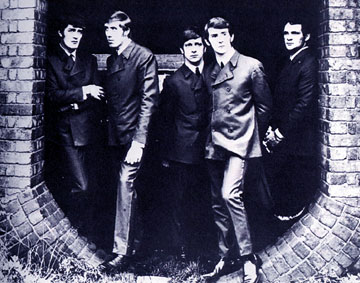
BIRMINGHAM
Updated May 1, 2024
Graeme Edge vocal, drums, percussion
Denny Laine vocal, guitar, harmonica (left 1966)
Mike Pinder vocal, piano, mellotron (left 1978)
Ray Thomas vocal, harmonica, flute, saxophone, percussion (left 2003)
Clint Warwick vocal, bass guitar (left 1966)
Justin Hayward vocal, guitars, sitar, keyboards (joined 1966)
John Lodge vocal, bass guitar, cello, guitars (joined 1966)
Patrick Moraz keyboards (joined 1979, left 1991)
"Mike apparently came up with the name but I always thought I came up with the 'Moody' part because I saw it as a blues band"
The Moody Blues were the first of the Brum Beat bands to become internationally famous and would later have a huge influence on what became known as "progressive rock". Formed in May of 1964 in Birmingham as "The Moody Blues 5", they took their name from the local M&B brewing company in hope of getting sponsorship. The group members came from various Birmingham bands who are worth mentioning as follows:
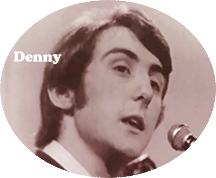
Lead singer and guitarist Brian Hines (Denny Laine) was born 29th October 1944 and lived in Holcombe Road, Tyseley. One of his earliest bands was "Johnny Dean and The Dominators" who played regularly at The Mermaid pub on Stratford Road. Johnny Dean was an early alias for Brian who worked at Rackhams by day but he would soon turn professional in 1962 with the new name of "Denny Laine" and fronting "The Diplomats", a well known Midlands group that also included future Move and E.L.O. drummer Bev Bevan (see Denny Laine and The Diplomats).
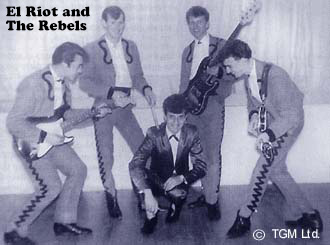
Ray Thomas was born in Stourport on 29th December 1942. As a teenager in Erdington, he joined a skiffle band called "Saints and Sinners" during the late 1950s in which he played the tea-chest bass. Apprenticing as an engineer, Ray formed his first professional band 'El Riot and The Rebels' as their lead singer and harmonica player.
The Rebels line-up also included drummer Bob Sheward as well as guitarists Brian Betteridge and John Lodge who was born in Birmingham on July 20, 1945 and lived in Erdington at 70 Inland Road. Also living in Erdington on Wheelwright Road was piano player Mike Pinder, born 27th December 1941. He played part-time with El Riot and The Rebels and had previously led his own group called "The Rocking Tuxedo's".
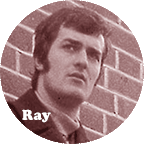
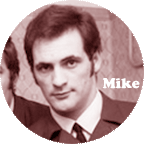
El Riot and The Rebels became known for their energetic stage show for which they wore Mexican cowboy outfits. They managed to become regulars on the Noel Gordon hosted "Lunchbox" television show produced in Aston. John Lodge switched to bass guitar when the band acquired Mike Heard as lead guitarist. El Riot and The Rebels eventually split in 1963 when they were offered some lengthy bookings in Germany but only Ray Thomas and Mike Pinder wanted to go and John Lodge left to begin a drafting apprenticeship.
Ray and Mike then joined a local group called The Krewcats (not to be confused with Shadows drummer Brian Bennett's band of that name) with whom they went over to Germany from May to November of 1963. Performing in Hamburg and Hannover, the Krewkats were well received but rarely paid what they were owed by notorious club owner Peter Eckhorn who held on to their passports and work visas!
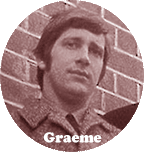
Meanwhile back in Birmingham, Graeme Edge who was born 30th March 1941 and lived in Coventry Road, Small Heath, was playing drums in a group called Gerry Levene and The Avengers. This band also included Jim Onslow on bass guitar and guitarist Mike Hopkins who would later join The Diplomats. Gerry Levene was the stage name for Aston singer Micky Gibbs. For a short time, the Avengers lead guitarist was Roy Wood (see Mike Sheridan and The Nightriders).
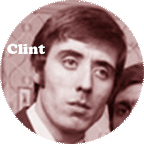
Albert Eccles from Aston, was born on 25th June 1940, and had started playing guitar as a member of a skiffle group called "The Rainbow Boys". He changed his name to the more suitable Clint Warwick (inspired by American vocalist Dionne Warwick) after joining Danny King's Dukes as their bass guitarist (see Danny King). They were well known throughout the Midlands and also managed to secure a season at Butlins holiday camp in Scotland.
When Ray Thomas and Mike Pinder returned from Germany (with no money) at the end of 1963, they found the Birmingham music scene made up of bands that imitated either "Cliff and The Shadows" or "The Beatles". The Spencer Davis Group was at that time standing apart from the rest with their exciting Rhythm & Blues based sound.
Danny King and Clint Warwick along with Graeme Edge and Gerry Levene of The Avengers, decided that R&B was the way to get noticed. Denny Laine from the Diplomats was also interested to start a new project, so the group started rehearsing and came up with the name "The Soul Preachers". Gerry Levene soon left after falling-out with Denny Laine.
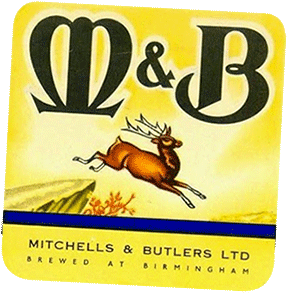
A chance meeting by Denny Laine with Ray Thomas and Mike Pinder at the Moathouse Club resulted in them also joining the line-up although by that time, Danny King had lost interest in the project and left. Ray Thomas later admitted he wanted his friend John Lodge to play bass guitar in the new group but John declined as he was committed to completing his drafting apprenticeship and so Clint Warwick stayed.
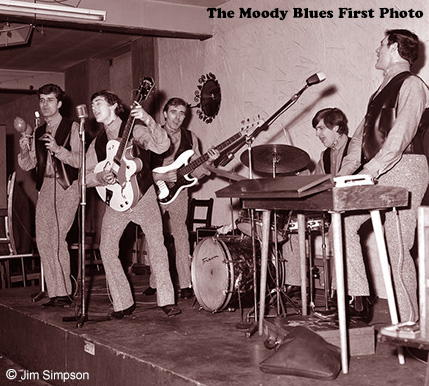
Forging ahead, a plan was put in place to gain sponsorship from the Birmingham-based Mitchells & Butlers brewery so the name "M&B Five" was adopted. Unfortunately, the beer company was not interested in sponsoring a pop group so the initials were adapted to represent "Moody" and "Blues". An early gig poster shows the group billed as The Moody Blues "5".
Denny Laine recalled; "Mike apparently came up with the name 'The Moody Blues' but I always thought I came up with the 'Moody' part because I always saw it as a blues band. I think Mike got it from a Miles Davis album Indigo Blue or something like that."
In May of 1964, the Moody Blues were rehearsing and performing regularly at Birmingham's "Carlton Ballroom" (later to become famous as "Mothers" club) in Erdington. Local jazz musician Jim Simpson who worked as a photographer for the 'Midland Beat' newspaper took the earliest known photo of the Moody Blues shown here performing at the Carlton. Jim later went on to discover and manage Black Sabbath.
"We went on and played our own type of rhythm and blues like 'I Go Crazy' and stuff like that and we went down a storm!"
Ray Thomas remembered a gig they played at The Moathouse Club in Birmingham. "In the audience was a guy called Tim Hudson. He was from London and he really liked us. He knew some people in London who were looking for a band to manage so mentioned us to them. They turned out to have a management company called Ridgepride but they were also the people behind 'Seltaeb' - a company that had the rights on all The Beatles merchandising - the name was actually 'Beatles' spelt backwards."
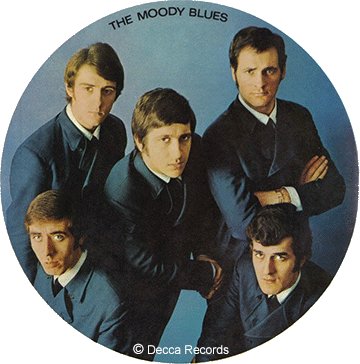
In this way The Moody Blues were introduced to London-based manager Tony Secunda who went on to play a major role in the careers of several Brumbeat groups. Denny Laine was later quoted in a magazine feature as saying; "We had the most terrible rows when we started as we were all used to having our own way. But the chap who was training us (Secunda) made us knuckle under to the firmest discipline and eventually we all got pulling together. Now we trust and respect each other completely."
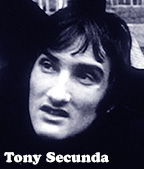
A big break came when Tony Secunda got the band to perform a regular spot at London's famous Marquee Club. Ray Thomas said; "All the great bands had their own night at The Marquee. Manfred Mann had a regular spot but their singer Paul Jones had bad laryngitis and couldn't sing. At the last minute, we were called to fill-in for them. We went on and played our own type of rhythm and blues like 'I Go Crazy' and stuff like that and we went down a storm! Things took off from there."
The Marquee management offered The Moody blues a regular night to perform. Denny Laine said; "The Marquee was an important step for us and we played regularly but also backed visiting American musicians whilst they were in the UK." It wasn't long before Tony Secunda arranged a record deal with the Moody Blues signing to the prestigious Decca Records label.
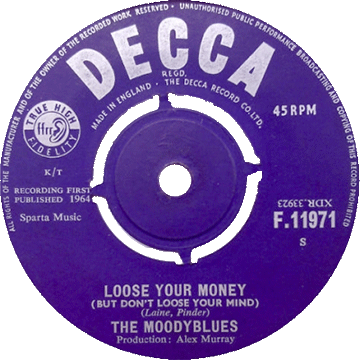
Produced by Alex Murray (Alex Wharton), The Moody Blues' first single titled 'Steal Your Heart Away' was a soulful effort and the B-side 'Lose Your Money', co-composed by Denny Laine and Mike Pinder was an energetic though typical beat-style recording. The single did not chart but the Moody Blues appeared on television for the first time on ITV's pop music show "Ready Steady Go!"
Looking for hit material, the Moodies second single was an inventive arrangement of an obscure song by American singer Bessie Banks. Denny said; "We knew a schoolboy named James Hamilton who had a fantastic record collection. He knew a New York disc jockey B. Mitchell Reed, and through them we got a lot of material which nobody else was doing - like 'Steal Your Heart Away' and 'Barefootin'. 'Go Now' was another one. Bessie Banks did a great version - slow like 'Love Letters' but we bopped it up, put harmonies on it, made it sort of gospel in our own limited way."
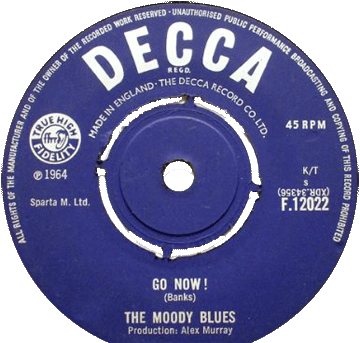
Their producer Alex Murray recalled; "The band had played the song for the first time in London at a Marquee gig and that night they blew the crowd away - took them somewhere else! It was a unique song which matched their unique interpretation so I knew before we went into the studio that it was the 'big one' if we could only get it right and re-capture the atmosphere they'd created at the Marquee."
With Denny Laine's mournful vocal and Mike Pinder's memorable piano intro, the record featured a group vocal backing that would become a Moody Blues trade mark. The song was 'Go Now' and it became a worldwide hit for the Moody Blues in late 1964, reaching Number One in the British charts and also making top ten in the USA. This sudden success resulted in many radio and TV appearances for the group plus a hectic schedule of both national and international touring (to read record producer Alex Wharton's true story of the historic Go Now recording session click HERE).
"You will probably call it contemporary blues - it could be if you want it to be. It doesn't matter, just let it pass through you"
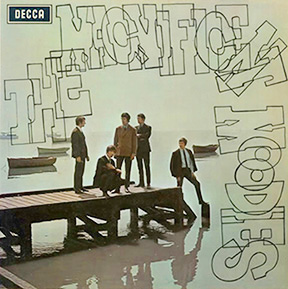
A follow-up single proved hard to find but the group's first album titled "The Magnificent Moodies" was hurriedly recorded to cash in on the success of Go Now. The LP (preceded by a four song EP), consisted of songs the band were performing in their stage show in addition to four original tracks co-composed by Denny Laine and Mike Pinder. The list included favourites like James Brown's 'I Go Crazy', George Gershwin's classic 'It Ain't Necessarily So' (sung by Ray Thomas) and the Laine/Pinder composition 'From The Bottom Of My Heart' which was also issued as a single.
Significantly, Ray Thomas played a flute on some of the album tracks which was certainly unusual for a blues-based band. He recalled; "My grandfather played one as a young man and I just liked its sound really. I think the first time I used it was an alto flute on From The Bottom Of My Heart." However, to Ray's chagrin his flute part was lost on the final mix of this record as well as on 'I Don't Want To Go On Without You', although it can clearly be heard on their live recordings made for the BBC at the time.
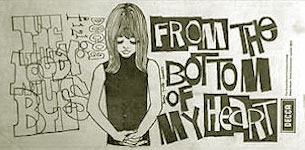
Pop star 'Donovan' wrote an interesting introduction for the Moody Blues LP back cover; "...Their writing has all the sensitiveness an' feeling that makes music cool to listen to. The tracks on this LP will show the sort of scene they have got going. You will probably call it contemporary blues - it could be if you want it to be. It doesn't matter, just let it pass through you."
Another original Laine/Pinder song by The Moody Blues titled 'Stop' was issued as a single in the U.S.A. and managed to get a chart placing there. The band joined the famous "British Invasion" and were sent over to America on a package tour together with chart-toppers 'Peter & Gordon' and fellow brummies The Fortunes. The Moodies performed at the NME Poll Winners concert at Wembley to an audience of 60,000. They also obtained the prestigious position of playing support for The Beatles on their 1965 British tour.
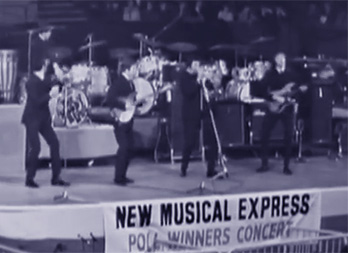
The Moody Blues were by this time living together in a large rented house in the Roehampton area of London. Famous pop stars of the day including the Beatles were regular visitors there. During one of the many parties, girls were climbing through the windows to get in. Paul McCartney was in the loo at the time and Mike Pinder believes this inspired the Beatles song 'She Came In Through The Bathroom Window'. Unfortunately for the Moodies, this house was later burgled and their instruments stolen with the exception of Ray's beloved flute that lay unnoticed on the fire mantel.
Despite the massive success of Go Now, subsequent singles by the Moody Blues had diminishing impact on the record charts. This was at a time when pop groups depended on regular hit singles rather than album sales for their survival. The Moody Blues' self composed fifth single 'Everyday' released in October 1965 had only got to Number 44 in the charts despite its commercial appeal.
By 1966 the group were obliged to reduce their booking fees while playing more and more gigs to keep up with expenses. Beatles manager Brian Epstein had taken over management of the Moody Blues in September 1965 but this did little to improve their situation.
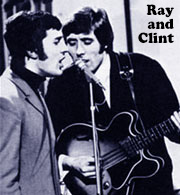
The Moody Blues' refusal to record a song called 'Those Were The Days' as suggested by The Beatles' own Paul McCartney may not have helped things either as far as their record company was concerned. The song was later covered by Apple recording artist Mary Hopkin who had a huge international hit with it. By the summer of 1966, the intense pressure the band found themselves under was beginning to take it's toll.
In August, bass guitarist Clint Warwick who disliked touring, left the Moody Blues at the end of their American tour. As the only married band member, he quit the music business and went back to Birmingham to work as a carpenter. Clint Warwick passed away in 2004 (see the BrumBeat Clint Warwick story). He was replaced temporarily by Rod Clark (from Carter-Lewis and The Southerners) who later joined The Rockin' Berries.
"We were tagged 'one-hit-wonders'. We had nine months of glory and then went back to 50 pound a night on the road!"
Towards the end of 1966, the Moody Blues were in debt and faced the prospect of performing on the cabaret circuit to make ends meet. Graeme Edge recalled; "We were tagged 'one-hit-wonders'. We had nine months of glory and then went back to 50 pound a night on the road!" The group were recording tracks for their proposed second album but without a hit single, the band's future as a recording act seemed questionable.
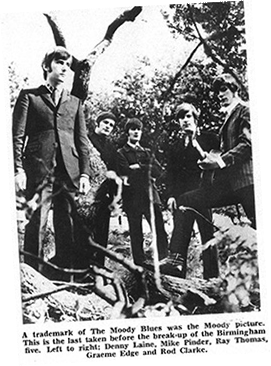
On September 24, Denny Laine officially announced he had left the Moody Blues to embark on a solo career under management of Brian Epstein (see Denny Laine). To some, Denny Laine was the Moody Blues. Denny said; "Although I'd gone off to do my own thing, I stayed friendly with everyone. Actually, I was still staying with Mike in his flat in Putney when they started to put their new band together."
While the music papers announced the demise of The Moody Blues, Ray Thomas, Mike Pinder, and Graeme Edge decided to carry on. Former El Riot and The Rebels bass guitarist John Lodge who had completed his drafting apprenticeship, was playing in a Birmingham group over in Germany called the John Bull Breed along with former Rebels guitarist Mike Heard.
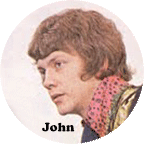
Ray Thomas phoned John Lodge and said to his former bass guitarist; "How about getting the old band back together?" John's enthusiasm to join the Moodies was confirmed when he sold some of his bass gear to help finance the group's next tour. John would go on to compose some of the Moody Blues best loved songs.
Denny Laine's position in the revised line-up was filled by singer/guitarist Justin Hayward who came from Swindon. As fate would have it, Ray Thomas met up with famous Newcastle vocalist Eric Burdon at a well-known London live-music bar called "The Bag O'Nails Club". While having a drink with Eric, who had recently auditioned applicants for his new 'Animals' line-up, the young guitarist was one of the names he recommended to Ray.
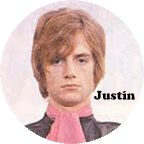
Justin Hayward was born on October 14, 1946 and grew up in Swindon. American rock 'n' roll star Buddy Holly was a huge early influence on Justin who moved to London to seek his fortune after finishing grammar school. A talented guitarist, Justin played in a few local beat groups before scoring a job with popular UK singer Marty Wilde as a member of "The Wilde Three" with whom he performed for the next two years. It was during this time that Justin started to write his own songs and went on to record a single titled 'London Is Behind Me' issued under his own name on Pye Records in January 1966.
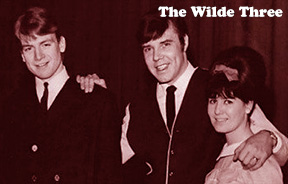
Mike Pinder went over to pick up Justin Hayward and drove him round to meet the rest of the band. Mike's car had a record player so Justin played him his solo 45. Upon hearing the recording, Mike was impressed and recalled thinking; "He's the one for us. As far as I'm concerned you're in the band!"
Meanwhile, Decca Records continued to release "new" Moody Blues singles from material that had been recorded with the original line up of the band including the Mike Pinder/Denny Laine composition 'Boulevard De La Madeleine' which has been regarded by some as one of their best tracks.
The re-formed Moody Blues took on a schedule of "northern cabaret" dates in order to raise desperately needed funds. The group initially performed many of the songs played by the previous line-up including 'Go Now' with a lead vocal attempted by both Ray Thomas and Justin Hayward, but it just didn't sound right. Following a less than enthusiastic audience response at one of the clubs, the band all agreed that the old set along with the blue suits had to go.
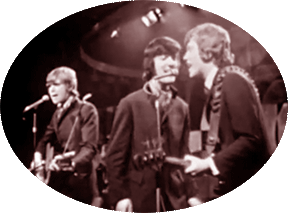
The first single to be recorded by the new Moody Blues line-up was Justin Hayward's 'Fly Me High', a deliberate and catchy attempt on the record charts, that was released in May of 1967. The recording session introduced the band to Coventry-born Tony Clarke who would go on to produce the Moody's biggest-selling albums. Despite airplay on pirate radio stations, the single failed to gain a chart position. Interestingly, the song was later covered by the West Midlands band Ambrose Slade as a track on their first album in 1969.

The pop music scene was rapidly changing with new and innovative sounds capturing the attention of young record buyers. The Moody Blues had changed their musical direction by early 1967 with Mike Pinder supplementing his piano with a "Mellotron" - a revolutionary and mechanically-complex instrument that used a system of pre-recorded tapes to create a distinctive orchestral/atmospheric sound and was forerunner of today's modern electronic sampling keyboards.
Mike had purchased his instrument second-hand at a bargain price from Birmingham's Dunlop Tyres employees recreation club where it had languished mostly unused. The Beatles had pioneered the use of a mellotron on their ground-breaking 'Strawberry Fields Forever' single, while Stevie Winwood's new group Traffic had used the Mellotron extensively on their hit record 'Hole In My Shoe'.
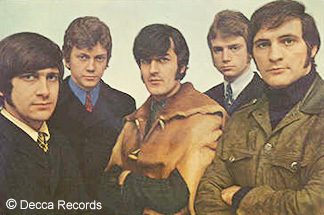
(Note: the Mellotron was developed and manufactured by the Bradley Brothers at Streetly Electronics in Birmingham. Mike Pinder also worked at Streetly Electronics in the early 1960s. To read more about the Mellotron, click HERE or see the feature on the Brum Beat Features page.)
As a sign of things to come, the Moody Blues next single A-side composed by Mike Pinder titled 'Love And Beauty' was the first to feature the Mellotron on a Moody Blues recording. Although it failed to chart, this innovation along with group-written songs having mystical lyrics, and complex arrangements would set them apart from most other pop acts of that time. The Moody Blues went over to Belgium at the invitation of a music club owner there who put them up while the band played a few shows and concentrated on writing songs.
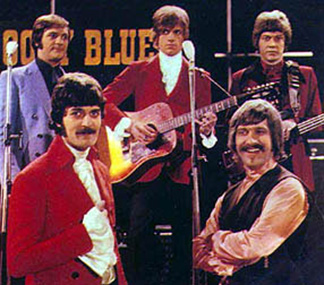
The Moody Blues developed a stage show with music and lyrics based on the concept of a day in the life of a typical working man. Mike Pinder came up with "The Dawn" (Dawn Is A Feeling) to which Justin Hayward wrote "The Night" (Nights In White Satin). Other songs came quickly based on the themes of "The Morning", "Lunch Break", "The Afternoon" and "Evening" with songwriting contributions from all the group members.
With the inclusion of spoken poetry introducing the songs, the Moody Blues' innovative stage presentation started to gain them a new audience. The band toured France in the summer of 1967 where they found themselves hugely popular. To the group's complete surprise - they discovered one of their earlier R&B records titled 'Bye Bye Bird' was at Number One in the French charts!
"It was all very hippie you know - low lights and incense burning!"
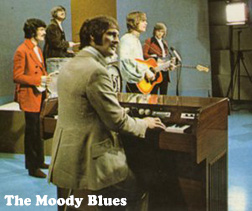
Decca Records became interested in the Moody Blues' new "progressive" sound and proposed an experiment where the group would record an album of classical compositions by Dvorak and supported by a full symphony orchestra. The record company intended to use the results of this as a means of demonstrating their new "Deramic" stereo recording process.
The Moody Blues went a step further and with the co-operation of orchestral arranger Peter Knight and executive producer Hugh Mendl who gave his support, recorded enough of their own compositions for an entire album in just five days with the London Festival Orchestra.
John Lodge remembered; "We went to Decca and said "Can we have lock-out time?" i.e. we wanted the studio 24 hours a day so we could set up all our equipment and just record. In those days you could only record in strict morning sessions." Ray Thomas said; "We never actually worked with the orchestra. All we did was ship each track to Peter Knight who wrote and scored the orchestral bridges. It was all very hippie, you know - low lights and incense burning!"
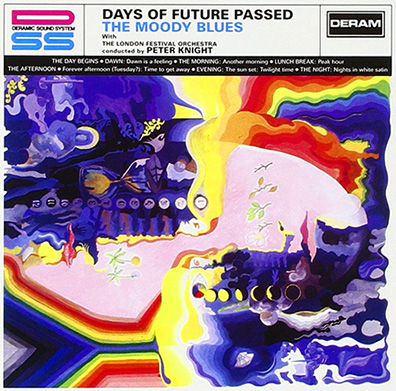
Despite initial reluctance by the record company, the resulting collection of completed tracks entitled "Days Of Future Passed", was released on the Decca subsidiary Deram label that was specialising in progressive music. Walt McGuire who was head of the Decca 'London Recordings' label in the USA was sure the record would sell in the States. The timing was perfect as American radio was breaking into the FM stereo format and there was a demand for new pop albums fitting this requirement.
Days Of Future Passed - issued in November of 1967 - was a milestone in music, giving rise to the "concept album" on which the songs were linked by a similar subject matter or common theme. It reached Number 27 in the UK and Number 3 in the USA charts thus gaining the band a foot-hold on the all-important American market. The album was to become a huge influence on many other groups for years to come.

Hugh Mendl wrote for the album's back cover; "In Days of Future Passed, the Moody Blues have at last done what many others have dreamed of and talked about: they have extended the range of pop music, and found the point where it becomes one with the world of the classics."
From the album came the Moody Blues' classic single 'Nights In White Satin', written by Justin Hayward, and reaching Number 9 in the UK, becoming their first Top 20 hit since Go Now. Justin's inspiration for the song was white satin bed sheets given to him by his girlfriend at the time. Another innovative single also composed by Justin titled 'Tuesday Afternoon' reached Number 24 in the USA and sell-out concert tours soon followed.
Building on the concept album format, the Moody Blues next LP issued in 1968 titled "In Search Of The Lost Chord" was a major success on both sides of the Atlantic and it again featured the songwriting efforts of all the group members. Based on the ambitious concept of quest and discovery, this album unlike their previous one, had the group playing all the instruments themselves without any orchestral backing.
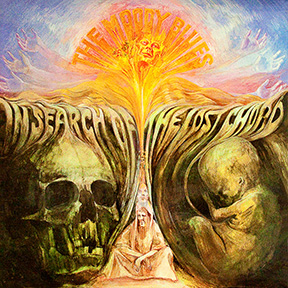
John Lodge said; "We'd used the orchestra on Days Of Future Passed and we inwardly thought the next album must be us on our own. We had Ray playing French horn, I played cello... but it didn't matter because we were experimenting - from sitar to tablas."
Ray Thomas remembered; "I was given a lunchtime to learn this piece on the oboe - I'd never seen a bloody oboe before. It was like, oh you can do it! Then everybody buggered off down to the pub and came back and said, have you got it yet?"
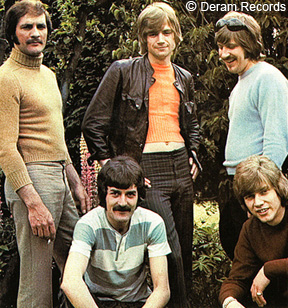
In Search Of The Lost Chord included the classic song 'Legend Of A Mind' composed by Ray Thomas as a tribute to the American LSD pioneer Timothy Leary with whom he had met during the previous American tour. It's probably one of the great album tracks of all time. This LP also yielded hit singles such as Justin Hayward's 'Voices In The Sky' and John Lodge's 'Ride My See Saw' which both scored high chart placings.
The question of LSD and other drug use by the Moody Blues at that time inevitably arose as some "psychedelic" sounding rock groups were known to take them. Years later, Justin Hayward admitted; "I certainly did. It became part of my life for a while until maybe ten or twelve trips and I thought well that's probably it now, I've done it and I'm really glad that I did."
Mike Pinder said; "It works in terms of if you were an artist you would end up with more pastels or colour varieties because you would notice the subtle differences. It's the same with listening to music in that you enjoy it most when you're in a meditative state and so I think the drug influence was able to put you into that state instantly."
"I know it sounds terribly pretentious now but as young men, that's what we were searching for"
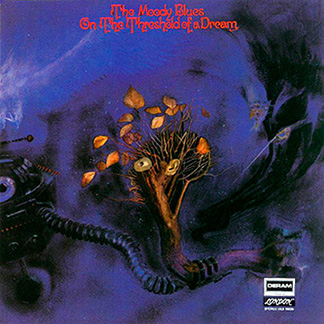
In 1969, the Moody Blues album "On The Threshold Of A Dream" was issued which topped the charts in the UK and scoring high in the USA. On the making of this album Justin Hayward years later said; "We wanted to collect religious and psychedelic influences onto an album and turn them into a pathway into enlightenment, if you like. I know it sounds terribly pretentious now but as young men, that's what we were searching for."
Pretentious or not, the well-crafted music of the Moody Blues continued to gain them millions of fans all over the world. The financial success of their LPs inspired the group to form their own "Threshold Records" label and record shops. This had the band members eventually spending more time going to business meetings than they had in the recording studio. The West Midlands "super group" Trapeze, and local singer Nicky James were a few notable signings to appear on the Threshold label.
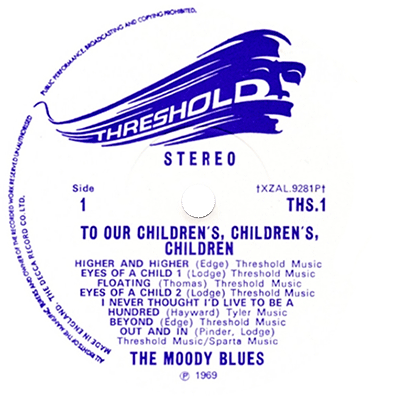
The Moody Blues late 1969 album titled "To Our Children's, Children's, Children" explored the concept of space travel as was popular in news and culture at the time due to the race in landing a man on the moon. By now, the group's LP's were outselling their singles as more record buyers purchased the latest stereo hifi equipment with the traditional "mono" format now obsolete.
The Moodies out-worldly recordings certainly lent themselves to the latest audio technology of which America in particular developed a huge market for. It should also be mentioned that the group placed great importance on album packaging with elaborate artwork and gatefold record sleeves that became a standard for 1970s rock albums.
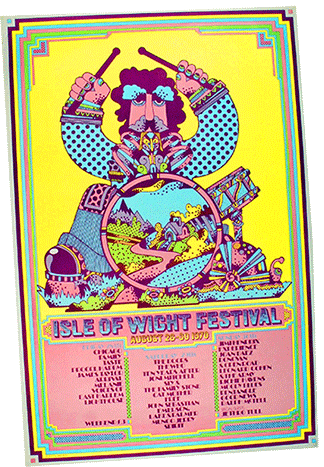
In August of 1969 along with Bob Dylan and The Who, the Moody Blues performed at the legendary "Isle Of Wight Festival" in southern England to an audience of about 150,000. They returned the following year playing to an incredible estimated 600,000 people along with other famous groups including Jimi Hendrix, The Who, The Doors, and Jethro Tull amongst others. The Moodie's performance was filmed by Murray Lerner and issued on DVD in 2009.
The Moody Blues 6th LP issued in 1970 titled "A Question of Balance" got to Number One in the UK album charts. It included the brilliant hit single 'Question' that got to Number Two - the group's highest placing for a 45 since Go Now.
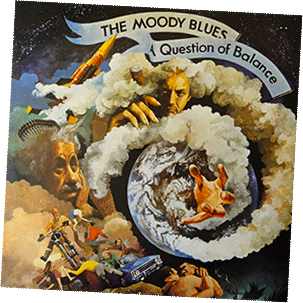
Justin Hayward said; "I'd written 'Question' on the morning of the recording session. It was recorded in just a few takes. I was very aware of the anti-war movement in America which had grown thanks to the Vietnam war. It was a protest song about the state of the world which I feel is still very relevant today."
Another great highlight from Question of Balance was Mike Pinder's composition 'Melancholy Man' that was also issued on a single in some countries and topped the record chart in France. In addition to the Mellotron, Mike also played a Moog synthesizer on this and other album tracks.
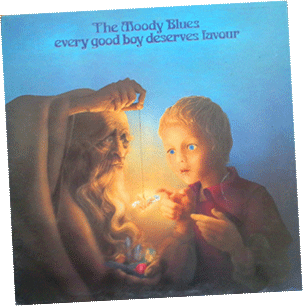
Now at the height of their popularity, the Moody Blues recorded another big selling album the following year titled "Every Good Boy Deserves Favour" and again featuring compositions by all the group members. Notably on this LP, Graeme Edge played the very first "electronic" drums heard on a record. Justin Hayward's composition 'The Story In Your Eyes' was issued as a single but surprisingly didn't make a big impact in the charts although it's one of the group's most recognizable songs and still in heavy rotation today on many "classic rock" stations.
Although having toured consistently around the world for several years with little time off, The Moody Blues managed to record one of their strongest albums issued at the end of 1972 titled "Seventh Sojourn". For this LP, Mike Pinder replaced his trusty Mellotron with a "Chamberlin" that was a similar type of keyboard having pre-recorded instruments but with a more powerful and better quality sound.
"We were all exhausted and had become prisoners of our own success"
However, the strain on the group was beginning to show during the making of Seventh Sojourn. Ray Thomas recalled; "By the time we began the sessions I think we needed a break from each other. Up to that time everywhere one of us went, the others would be there too. All my experiences were their experiences." Mike Pinder said; "We were all exhausted and had become prisoners of our own success."
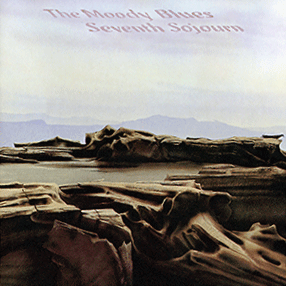
For Seventh Sojourn, John Lodge contributed some of his best songs - the reflective 'Isn't Life Strange' and the energetic 'I'm Just A Singer (In A Rock And Roll Band)' that were both issued as charting singles. The latter track was John's response to fans who tried to find deep meaning in the group's songs and lyrics. This LP was a big success, climbing to Number One in the American album charts. At almost the same time, their 1967 record 'Nights In White Satin' took on a life of its own and also made it to Number One!
The Moody Blues international success continued well into the 1970s before the band ground to a halt under strain from the pressure of touring, recording, and trying to balance the demands of a "normal" family life. While taking what turned into a six-year break from the band, all the group members made solo albums and worked on other musical projects. During this time, Mike Pinder whose first marriage ended in divorce, married an American and moved permanently to the USA.
Justin Hayward and John Lodge along with producer Tony Clarke notably collaborated on an acclaimed album issued under the name "Blue Jays" in 1975. Justin also scored high in the charts with his hit-single recording of Jeff Wayne's 'Forever Autumn' from the popular "Jeff Wayne's Musical Version of The War Of The Worlds" LP in 1978.
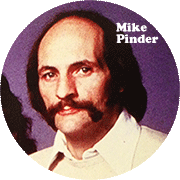
The group re-united and the final album recorded by the "classic" Moody Blues line-up in 1978 was titled "Octave" after which founding member Mike Pinder refused to go on tour in support of it. He was replaced by former YES keyboardist Patrick Moraz but it wasn't until a few years later that it was officially announced Mike had left the group. The underrated Octave was also the final Moody Blues album on which their long-time producer Tony Clarke played a part. Sometimes referred to as the "sixth" member of the group, Tony passed away in January 2010.
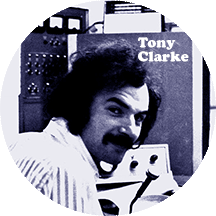
The 1980s saw The Moody Blues score high with their new million-selling album titled "Long Distance Voyager" that topped the charts in 1981 and contained hit singles 'The Voice', 'Gemini Dream' and 'Talking Out Of Turn'. This album began a remarkable "second comeback" for a band that could easily have been written-off in the post-punk music landscape.
More new Moody Blues albums followed and four years later, the group were re-discovered by a huge new audience on the popular and influential "MTV" music channel thanks to captivating videos of their records like 'Your Wildest Dreams' and 'I know You're Out There Somewhere'.
The Moody Blues line-up continued to fluctuate over the next few decades with Patrick Moraz replaced by a succession of keyboard players including Bias Boshell, Guy Allison, and Paul Bliss. The updated Moody Blues sound with electronic drums and keyboards - sometimes compared with the contemporary "synth-pop" - did not sit well with some of their fans who longed for the old progressive days of the Mellotron. However, the group continued to get hit records and their new albums supported by regular tours were big sellers.

Founding group member Ray Thomas retired from the band in 2003 due to health concerns. Sadly, he passed away in January 2018 (see Ray Thomas feature). The touring line-up of the Moody Blues reverted to core members Graeme Edge, Justin Hayward, and John Lodge with the addition of 2nd drummer Gordon Marshall, Alan Hewitt (keyboards), Norda Mullen (flute/acoustic guitar), and Julie Ragins (keyboards).
Their later concert performances included a healthy balance of "classic" album cuts along with more modern "pop" hits all drawn from the band's 50 year history (to see a review, click HERE). Although the Moody Blues record releases have not been so frequent since, they continued to tour and remain the most successful of all the Birmingham groups from the 1960s in terms of longetivity and international acclaim.
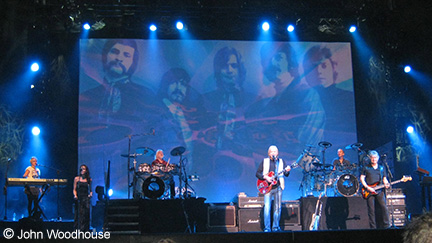
In 2018, The Moody Blues had their long-awaited induction into the USA's famous "Rock & Roll Hall of Fame". The induction ceremony in Cleveland Ohio was attended by surviving former group members Denny Laine and Mike Pinder as well as continuing members Graeme Edge, John Lodge, and Justin Hayward.
Graeme Edge passed away on November 11, 2021 at 80 years of age (see Graeme Edge tribute). As the last remaining founding member in the line-up, it was decided the band would not continue without him. Justin Hayward said; "When Graeme told me he was retiring, I knew that without him it couldn't be the Moody Blues anymore."
Moody Blues founding member Denny Laine passed away on December 5, 2023 age 79 (see Denny Laine tribute). Mike Pinder who was the last remaining original group member passed away on April 24, 2024 age 82 (see Mike Pinder tribute).
The Moodies former producer Tony Clarke left what is perhaps a fitting tribute to the group when he said of the classic line-up; "It had been a wonderful ten or eleven years. When you expect it to just be one album and it turns into eight of them, that's a wonderful ride. I'm really proud of what we did and they are all my favorites and I'm very glad we did what we did. And it was driven by this Birmingham blues band who went on to bigger things."
Copyright © John R Woodhouse
Sources: 'The Harmony Illustrated Encyclopedia of Rock' 1982; 'The Guinness Book of British Hit Singles' 5th edition 1985; 'Brum Rocked!' and 'Brum Rocked On!' books by Laurie Hornsby 2003; Record Collector, July 1995; Threshold Records CD Re-issues booklets with interviews of Graeme Edge, Justin Hayward, John Lodge, Mike Pinder, and Ray Thomas; 'The Moody Blues DVD 3-Disc Set' Emperor Media Holdings SL 2006; Alex Wharton interview with Bulls Head Bob 2009; 'Back In The High Life - a biography of Steve Winwood' by Alan Clayson 1988; and 'Midland Beat' various issues.
The Moody Blues 1960s Record Releases
(highest UK chart position in brackets)
Singles:
Extended Player:
Albums:
Some official Moody Blues related websites are listed below:
The Official Moody Blues Web Site: http://www.moodybluestoday.com
Mike Pinder: www.mikepinder.com
Ray Thomas: www.raythomas.me
Denny Laine: www.officialdennylaine.com
Graeme Edge: www.graemeedge.com
John Lodge: www.johnlodge.com
Justin Hayward: www.justinhayward.com
To see a recent BrumBeat review of a Moody Blues live concert performance click HERE.
An excellent site by Tony Brown dedicated to rare Moody Blues items is: www.themoodyblues.co.uk